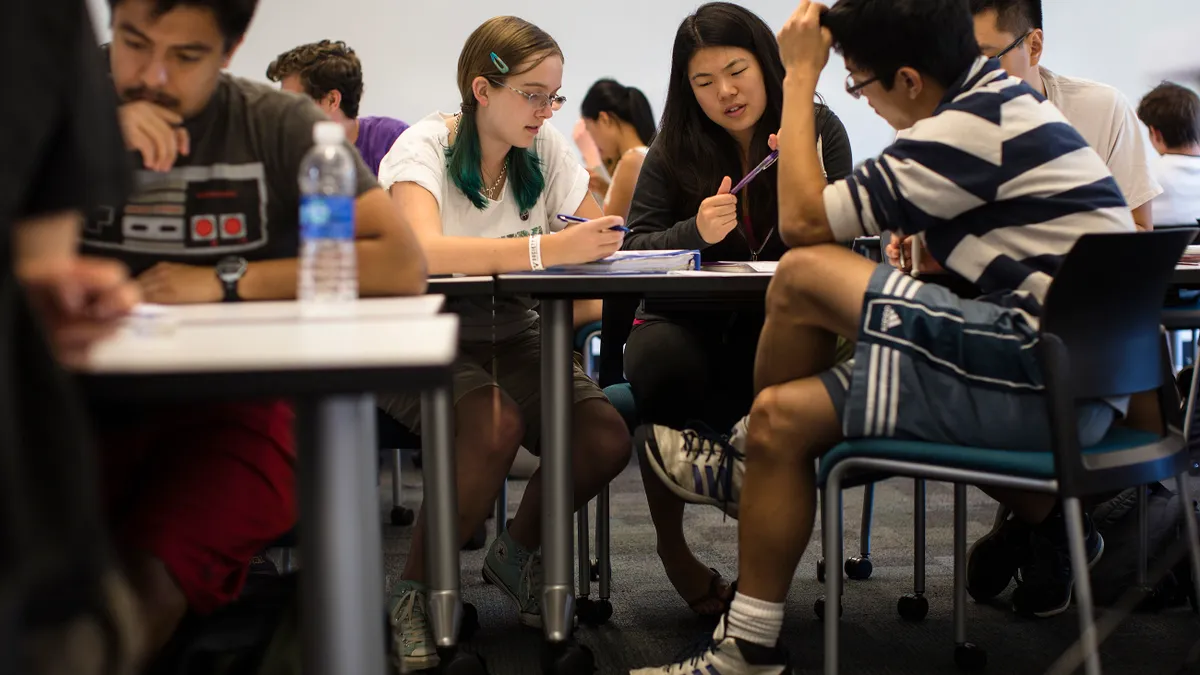Dive Brief:
- Academics, job placement potential and cost are the most important factors to high school students when choosing a college, according to new data from the National Center for Education Statistics based on a 2012 survey of more than 23,000 students, most of whom were 11th-graders.
- About three-quarters of students said academic quality and reputation, whether their desired program of study was offered and job placement was "very important," and about one-quarter more said each was "somewhat important."
- Two-thirds of students listed cost as "very important," while more than a quarter of respondents said it was "somewhat important." Family legacy was important to less than 40% of respondents, though 81% said recommendations from family and friends were important.
Dive Insight:
Public and private colleges are focusing on one of those wish-list items in particular: cost. Responding to consumer weariness of tuition price increases, some are underway with a host of "free college" efforts to reduce the sticker price through fundraising or major donor gifts.
On Sunday, former New York Mayor Michael Bloomberg said he planned to give $1.8 billion to his alma mater, Johns Hopkins University, to make it "forever need-blind." The funds — which are the largest private donation in higher education history — will allow the Baltimore university to increase grants to low-income students and remove loans from financial aid packages.
In August, New York University School of Medicine drew attention for its decision to cover all of its students' tuition through a $600 million fundraiser. As of the announcement, it had raised $450 million. Of that, $100 million came from Home Depot founder Kenneth Langone and his wife, Elaine Langone.
Efforts to reduce the cost burden for low- and middle-income students are rippling throughout higher education. In recent months, for example, Rice University announced discounts for students with family incomes up to $200,000 and Oglethorpe University said it will match what out-of-state students would have paid at their home state's flagship institutions.
The University of Virginia is waiving tuition for state residents with family incomes below $80,000 annually and the University of Illinois at Urbana-Champaign pledged free tuition for eligible students with family incomes of $61,000 or less.
Data show the real cost of college is leveling off. But just how effective these discounts will be at drawing a more diverse group of students is still to be determined. Early "free college" programs have received mixed reviews, with MarketWatch describing the movement as a nationwide "a patchwork of experiments" that are based on a "lofty idea" with implementation hurdles.
Bloomberg's announcement was met with a flurry of praise, no doubt in part due to the sheer volume of the sum. Yet the extent of its impact within Johns Hopkins and, more importantly, beyond that university is still to be determined.
Financial-aid experts told The Chronicle of Higher Education that the infusion could deepen the rift between publics and privates, increasing access for a small group of students who wouldn't otherwise have it but ultimately emboldening the position of highly selective colleges. Others were more positive, saying it calls attention to the importance of higher education for socioeconomic mobility and the need for the industry to lower the barriers to entry.










